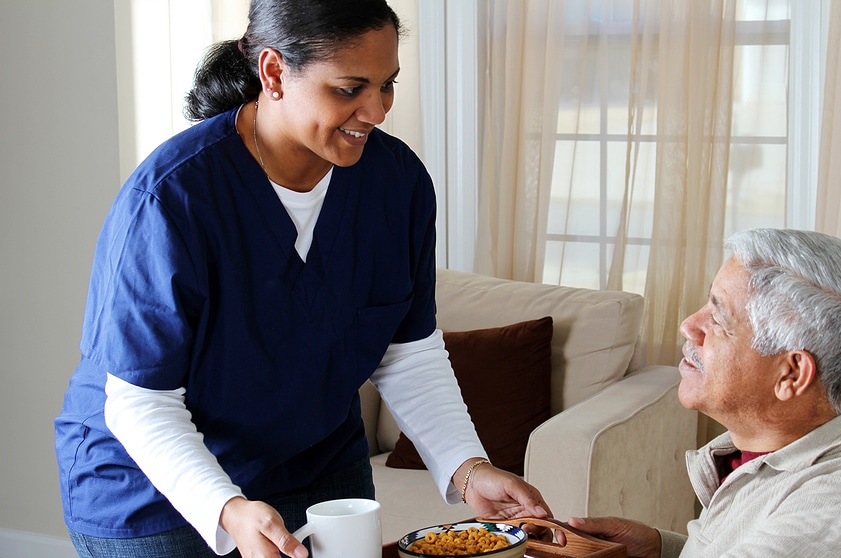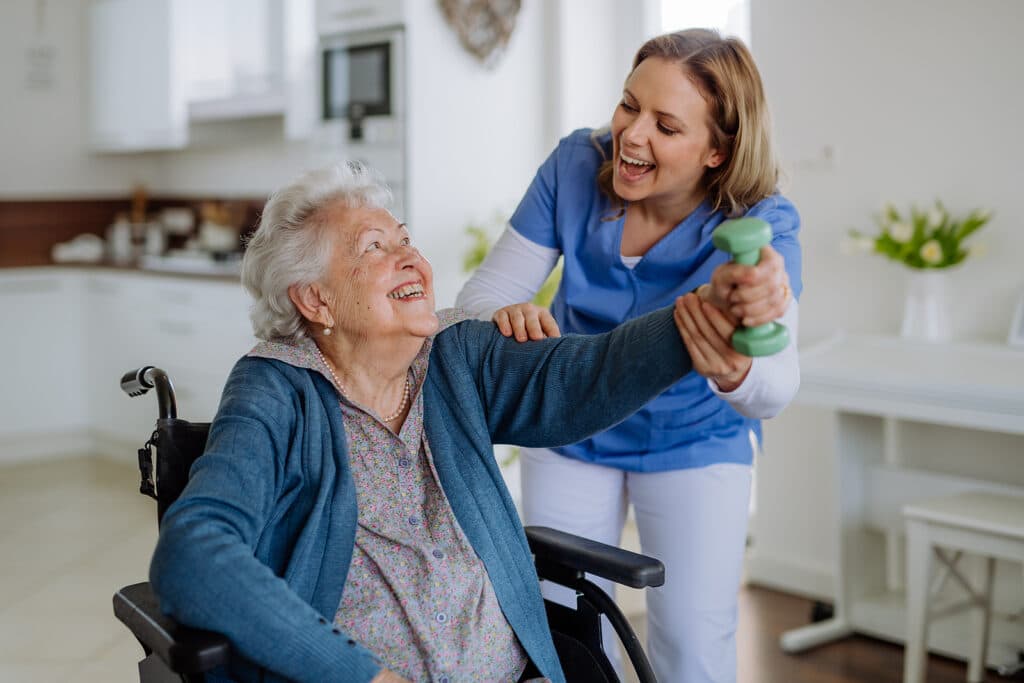Personal Care at Home
Aviva In-Home Care uses a Family-Centered Model of Care approach to home care services. Family-Centered care is made up of a set of values, attitudes, and approaches to services for clients with special needs and their families. Family-Centered care recognizes that each family is unique; that the family is the constant in our client’s life; and that they are the experts on the client’s abilities and needs.
Aviva works closely with the family to make informed decisions about the services and support the client and family receive. With Family-Centered care, the strengths and needs of all involved family members are considered. Studies have shown that health outcomes and levels of satisfaction are improved with this model of care. This is why this model is widely used at major health facilities across the U.S.
What is daily personal care at home?
Daily personal care refers to the routine tasks that are necessary to maintain an individual’s health and well-being. These tasks can include activities such as bathing, dressing, grooming, toileting, and eating. Daily personal care is often provided by family members or care professionals in the individual’s home and is designed to help our clients maintain their independence and improve their quality of life. The specific tasks involved in daily personal care can vary depending on the individual’s needs and preferences and may be provided on a regular basis or as needed.
What are examples of personal care?
Some examples of personal care tasks that care professionals may provide to individuals in their homes include:
- Assisting with transfers and walking to prevent falls and injury
- Helping with bathing, showering, and grooming, such as washing our client’s hair and assisting with oral care
- Assisting with dressing, including choosing clothes and putting them on
- Providing toileting assistance, such as helping the individual use the bathroom and changing incontinence products
- Helping with eating, including preparing meals, dietary planning, and food shopping assistance.
- Providing medication reminders
- Monitoring the individual’s health and well-being, including assisting with exercise and mobility
These tasks can vary depending on the individual’s needs and preferences and may be provided by a family member, a care professional, or a combination of both.
At Aviva, we have an expert management team that understands healthcare delivery, care professionals with multiple years of experience, and an organization focused on continual staff training & education.
Let’s Get Started
Aviva works closely with your family, throughout the care process, to make informed decisions about the services and support the client and family receive.

What Categories Fall under Personal Care?
Personal care typically includes assistance with activities of daily living (ADLs) and instrumental activities of daily living (IADLs). ADLs are basic self-care tasks that are necessary for maintaining good health and independence, such as bathing, dressing, grooming, toileting, and eating. IADLs are more complex tasks that are related to managing daily life, such as shopping, cooking, managing finances, and using technology. Personal care may also include activities that enhance emotional and social support.
Assistance With Bathing, Dressing & Grooming
Several factors may impede our ability to effectively care for ourselves as we get older. A loss of dexterity may make simple things like brushing one’s hair difficult. Arthritis in the hands can make buttoning a shirt a painful task. We may even forget specific basics of hygiene if we suffer from dementia. In turn, not being able to accomplish these tasks affects our ability to remain independent and can even lower our level of self-esteem.
Having a care professional to perform these tasks on a regular or even semi-regular basis can bring a huge relief to some elderly. Helping to dress a client can allow him or her to leave the house, to join in activities that bring joy to a normally quiet week. Assistance with a warm bath can elevate the mood, improving one’s sleep and overall level of comfort. Independence, dignity, comfort – these should all be key areas of focus when thinking about whether or not you or your loved one needs in-home care.
Transferring & Ambulation Assistance
For clients with mobility issues, moving from one area of the house to another can be very difficult, and if not done properly, can result in serious injury. Aviva’s experienced caregivers are knowledgeable about the principles of body mechanics and are prepared to assist your loved one with standing, walking, positioning, and transfers without causing injury to him/her. Training includes knowing about bone loss, and how to best protect seniors from falling.
All skeletal bones are at risk of breaking as we age. Very often it is the wrist or spine that is damaged. The wrist takes the brunt of the impact when we stop ourselves from falling. Our elderly clients are also at risk of spine injury when getting in or out of bed or the bath and can even injure the spine with a sharp twist or accidental movement. San Francisco seniors who are experiencing bone loss are at risk to develop Osteoporosis should they have a bone fracture. The Aviva team is trained in the use of transfer assistance devices, like a gait belt for example, that can be used to lift a client from one position to another. Proper assistance such as this will minimize the chance of injury and subsequent bone fracture, giving our clients peace of mind that they are able to navigate around their homes safely.
Toileting & Incontinence
Aviva’s responsive care professionals are trained and experienced in providing sensitivity and privacy while assisting with urinary and bowel care. Incontinence is common among the elderly, and we understand the numerous physiological and psychological complications this issue can lead to. Whether temporary or permanent incontinence, Aviva’s experienced senior care professionals will work with a client to best manage his or her condition, preserving self-esteem and dignity.
Additionally, our team members understand the role that toileting care can play in a client’s comfort and independence. Many elderly are not incontinent, but do need help with toileting. For example, a person with limited mobility may need help just to reach the toilet or be assisted with the use of a portable urinal. Or a senior with dementia may need reminders to use the toilet on a regular basis. After a complete needs assessment, our care professionals will work with these clients to provide optimal toileting and peri-care assistance.
Assistance With Range-Of-Motion Exercises
Range-of-motion exercises are designed to help relieve pain. Elderly who suffer from arthritis often keep their affected joints bent — especially those in the knees, hands, and fingers — because they’re more comfortable in that position. Although this may temporarily relieve discomfort, holding a joint in the same position for too long can cause permanent loss of mobility and further hinder the ability to perform daily activities.
The benefits of these exercises are:
• Help maintain normal joint movement
• Increase muscle flexibility and strength
• Help maintain weight to reduce pressure on joints
• Help keep bone and cartilage tissue strong and healthy
• Improve endurance and cardiovascular fitness
Often our clients are prescribed specific range-of-motion exercises by their physicians. While not intended to take the place of a therapist’s role, the work of Aviva’s care professionals can supplement therapists’ efforts by helping our elderly clients perform these exercises. When it comes to flexibility, the adage, “if you don’t use it, you’ll lose it” often holds true. There is nothing better for improving range of motion than regular exercise. Even simple movements, if done on a regular basis, can make a big difference in your quality of life. As we age, we may lose bone density, and in turn become more fragile. A sedentary lifestyle only exacerbates this progression. Weight-bearing exercises can assist with maintenance of bone density.

With Family-Centered Care, the strengths and needs of all involved family members are considered.
Let’s Get Started
Aviva works closely with your family, throughout the care process, to make informed decisions about the services and support the client and family receive.
Why Choose Aviva In-Home Care for Personal Care at Home Services?
Providing Personal Care in San Francisco, Burlingame, San Mateo, Hillsborough, Atherton, Menlo Park, Palo Alto, Berkeley, Lafayette, Orinda, San Bruno, Millbrae, San Carlos, Belmont, Redwood City, Mountain View, Sunnyvale, Los Altos, San Jose, Santa Clara, Albany, Montclair, Emeryville, Foster City, Oakland Hills, Berkeley Hills, San Leandro, Hayward, Richmond, Cupertino, Campbell, Los Gatos, Saratoga, Moraga, Claremont, Palo Alto Hills, & Los Altos Hills.
With Family-Centered Care, the strengths and needs of all involved family members are considered.




